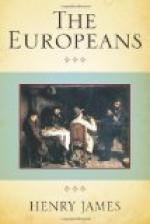She hesitated for a single moment—very naturally. Then, “Yes,” she said, simply.
He turned away; he wondered whether that would do for his lie. But he saw her again that evening, for the Baroness reappeared at her uncle’s. He had little talk with her, however; two gentlemen had driven out from Boston, in a buggy, to call upon Mr. Wentworth and his daughters, and Madame Munster was an object of absorbing interest to both of the visitors. One of them, indeed, said nothing to her; he only sat and watched with intense gravity, and leaned forward solemnly, presenting his ear (a very large one), as if he were deaf, whenever she dropped an observation. He had evidently been impressed with the idea of her misfortunes and reverses: he never smiled. His companion adopted a lighter, easier style; sat as near as possible to Madame Munster; attempted to draw her out, and proposed every few moments a new topic of conversation. Eugenia was less vividly responsive than usual and had less to say than, from her brilliant reputation, her interlocutor expected, upon the relative merits of European and American institutions; but she was inaccessible to Robert Acton, who roamed about the piazza with his hands in his pockets, listening for the grating sound of the buggy from Boston, as it should be brought round to the side-door. But he listened in vain, and at last he lost patience. His sister came to him and begged him to take her home, and he presently went off with her. Eugenia observed him leaving the house with Lizzie; in her present mood the fact seemed a contribution to her irritated conviction that he had several precious qualities. “Even that mal-elevee little girl,” she reflected, “makes him do what she wishes.”
She had been sitting just within one of the long windows that opened upon the piazza; but very soon after Acton had gone away she got up abruptly, just when the talkative gentleman from Boston was asking her what she thought of the “moral tone” of that city. On the piazza she encountered Clifford Wentworth, coming round from the other side of the house. She stopped him; she told him she wished to speak to him.
“Why did n’t you go home with your cousin?” she asked.
Clifford stared. “Why, Robert has taken her,” he said.
“Exactly so. But you don’t usually leave that to him.”
“Oh,” said Clifford, “I want to see those fellows start off. They don’t know how to drive.”
“It is not, then, that you have quarreled with your cousin?”
Clifford reflected a moment, and then with a simplicity which had, for the Baroness, a singularly baffling quality, “Oh, no; we have made up!” he said.
She looked at him for some moments; but Clifford had begun to be afraid of the Baroness’s looks, and he endeavored, now, to shift himself out of their range. “Why do you never come to see me any more?” she asked. “Have I displeased you?”
“Displeased me? Well, I guess not!” said Clifford, with a laugh.




